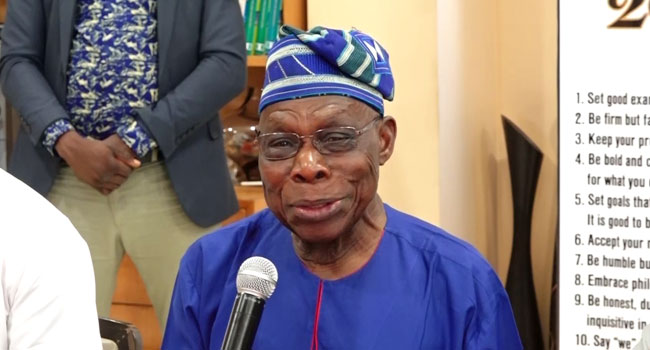Headlines
Obasanjo Criticizes Tinubu’s Government, Claims ‘Nigeria’s Decline Evident Under Emilokan’

Former President Olusegun Obasanjo critiques President Bola Tinubu’s administration, alleging a confirmation of Nigeria’s failing status under the “emilokan” mantra.
Former President Olusegun Obasanjo has criticized President Bola Tinubu, characterizing Nigeria’s condition under his leadership as “clearly a sign of failure” and expressing concern over the country’s ongoing issues with corruption and mismanagement.
In a statement released by his media aide, Kehinde Akinyemi, Obasanjo shared these comments while delivering the keynote address at the Chinua Achebe Leadership Forum hosted at Yale University in New Haven, Connecticut, USA.
Obasanjo remarked, “Nigeria’s situation is evidently dire for all to see.” Referring to Tinubu’s leadership, he further stated that the country’s failing state status is undeniable and obvious to every honest observer.
In his speech, “Leadership Failure and State Capture in Nigeria,” the former president linked the country’s issues to widespread corruption and inadequate leadership. He stated:
As a nation experiences increased immorality and corruption, it tends to descend further into chaos, insecurity, conflict, discord, division, disunity, depression among its youth population leading to restiveness. This is often marked by confusion violence which hampers development progress. Such has been largely observed in Nigeria under the leadership of Baba-go-slow and Emilokan.
Obasanjo cited Chinua Achebe’s influential 1983 book, *The Trouble with Nigeria*, expressing his agreement with the view that leadership failure is at the heart of the country’s problems. He stated, “Nigeria’s main issue is clearly and directly a lack of effective leadership. There isn’t anything fundamentally wrong with Nigerian character… The problem lies in its leaders’ reluctance or incapacity to meet their responsibilities and set personal examples—traits essential for genuine leadership.”
READ ALSO: Obasanjo, Shettima, Atiku Grace Kwankwaso Daughter’s Wedding in Kano
He compared Achebe’s mild critique with harsher evaluations from American scholars like Robert Rotberg and former U.S. Ambassador to Nigeria, John Campbell. They characterized Nigeria as “a fully failed state of critical geopolitical concern.”
Utilizing definitions from the World Bank and Transparency International, Obasanjo expanded on state capture as a form of corruption where influential individuals manipulate a country’s policies, economy, and resources for their own benefit. He highlighted instances in Nigeria where political elites exploit public institutions to the detriment of national development.
He cautioned that state capture can significantly impact economic development, regulatory quality, public service provision, the quality of education and health services, infrastructure decisions, as well as environmental conditions and public health.
Reflecting on the legacy of Chinua Achebe, Obasanjo referred to the esteemed author as “a great and distinguished Nigerian” whose contributions and principles remain impactful.
The former president’s critique has reignited discussions about the leadership challenges in Nigeria and highlighted the necessity for a transformative approach to governance.
